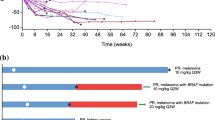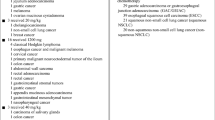Abstract
MSB2311 is a novel pH-dependent humanized anti-programmed death-ligand 1 (PD-L1) monoclonal antibody. This phase I study primarily aimed to determine the maximum tolerated dose (MTD)/recommended phase 2 dose level (RP2D) of MSB2311 in patients with advanced solid tumors or lymphoma. MSB2311 was intravenously administered at 3, 10, and 20 mg/kg every 3 weeks (Q3W) and 10 mg/kg every 2 weeks (Q2W) using 3 + 3 design. During expansion phase, eligible patients with either PD-L1 overexpression, Epstein-Barr Virus positive, microsatellite instability high/mismatch repair deficient, or high tumor mutation burden tumors were treated at RP2D. A total of 37 Chinese patients were treated, including 31 with solid tumors and 6 lymphoma. No dose limiting toxicity was reported and MTD was not reached. The trial was expanded at 20 mg/kg Q3W or 10 mg/kg Q2W, both of which were determined as RP2D. Most common drug-related treatment-emergent adverse events were anemia (43.2%), aspartate aminotransferase increase (27.0%), proteinuria (21.6%), alanine aminotransferase increase and hypothyroidism (18.9% each), thyroid stimulating hormone increased and hyperglycemia (16.2% each). Out of 20 efficacy evaluable patients with biomarker positive solid tumors, 6 achieved confirmed partial response with the median duration of response of 11.0 months (95% CI 7.0–11.4) and 4 had stable disease, resulting an objective response rate of 30.0% (95% CI 11.9, 54.3) and disease control rate of 50.0% (95% CI 27.2, 72.8). One partial response was also observed among 6 patients with lymphoma. MSB2311 demonstrated a manageable safety profile and promising antitumor activity in patients with advanced solid tumors and lymphomas.



Similar content being viewed by others
Data availability
Research data are not shared.
Abbreviations
- ADA:
-
Antidrug antibody
- CL:
-
Clearance
- DCR:
-
Disease control rate
- DLT:
-
Dose-limiting toxicities
- dMMR:
-
Mismatch repair deficient
- DoR:
-
Duration of response
- EES:
-
Efficacy evaluable set
- FAS:
-
Full analysis set
- ICIs:
-
Checkpoint inhibitors
- IWG:
-
International working group
- MAD:
-
Maximum administered dose
- MSI-H:
-
Microsatellite instability-high
- NCI-CTCAE:
-
National Cancer Institute common terminology criteria for adverse events
- ORR:
-
Objective response rate
- PD:
-
Progressive disease
- PD-L1:
-
Programmed death-ligand 1
- PFS:
-
Progression-free survival
- PK:
-
Pharmacokinetic
- PR:
-
Partial response
- RP2D:
-
Recommended phase 2 dose
- SD:
-
Stable disease
- TMB-H:
-
High tumor mutation burden
References
Zou W, Wolchok JD, Chen L (2016) PD-L1 (B7–H1) and PD-1 pathway blockade for cancer therapy: mechanisms, response biomarkers, and combinations. Sci Transl Med 8(328):328rv4
Xia L, Liu Y, Wang Y (2019) PD-1/PD-L1 blockade therapy in advanced non-small-cell lung cancer: current status and future directions. Oncologist 24(Suppl 1):S31–S41
Patel SP, Kurzrock R (2015) PD-L1 expression as a predictive biomarker in cancer immunotherapy. Mol Cancer Ther 14(4):847–856
Chang L, Chang M, Chang HM, Chang F (2018) Microsatellite instability: a predictive biomarker for cancer immunotherapy. Appl Immunohistochem Mol Morphol 26(2):e15–e21
Rodriquenz MG, Roviello G, D’Angelo A, Lavacchi D, Roviello F, Polom K (2020) MSI and EBV positive gastric cancer’s subgroups and their link with novel immunotherapy. J Clin Med 9(5):1427
Chan TA, Yarchoan M, Jaffee E et al (2019) Development of tumor mutation burden as an immunotherapy biomarker: utility for the oncology clinic. Ann Oncol 30(1):44–56
Xueming Q, Fei T, Huanhuan G, Zhen L, Xiao-Feng Q (2017) Characterization of a humanized PD-L1 blocking antibody with pH-dependent antigen binding in a humanized syngenic tumor model. J Clin Oncol 35(7_suppl):81–81
Xichun H, Jifang G, Dongmei J et al (2020) MSB2311, an anti-programmed death-ligand 1 antibody, in advanced solid tumors and hematological malignancies: Safety and tolerability, early anti-cancer activities from a phase I study in Chinese patients. J Clin Oncol 38(15_suppl):e15011–e15011
Lin S, Jifang G, Jian Z et al (2021) Updated safety and efficacy of MSB2311 (an anti-programmed death-ligand 1 antibody) in Chinese patients with advanced solid tumors and hematological malignancies from a phase 1 study. J Clin Oncol 39(15_suppl):e14547–e14547
Igawa T, Ishii S, Tachibana T et al (2010) Antibody recycling by engineered pH-dependent antigen binding improves the duration of antigen neutralization. Nat Biotechnol 28(11):1203–1207
Klaus T, Deshmukh S (2021) pH-responsive antibodies for therapeutic applications. J Biomed Sci 28(1):11
Baraibar I, Melero I, Ponz-Sarvise M, Castanon E (2019) Safety and tolerability of immune checkpoint inhibitors (PD-1 and PD-L1) in cancer. Drug Saf 42(2):281–294
Johnson DB, Chandra S, Sosman JA (2018) Immune checkpoint inhibitor toxicity in 2018. JAMA 320(16):1702–1703
Deng R, Bumbaca D, Pastuskovas CV et al (2016) Preclinical pharmacokinetics, pharmacodynamics, tissue distribution, and tumor penetration of anti-PD-L1 monoclonal antibody, an immune checkpoint inhibitor. MAbs 8(3):593–603
Liu D, Ma C, Lu P et al (2021) Dose escalation and expansion (phase Ia/Ib) study of GLS-010, a recombinant fully human antiprogrammed death-1 monoclonal antibody for advanced solid tumors or lymphoma. Eur J Cancer 148:1–13
Marabelle A, Fakih M, Lopez J et al (2020) Association of tumour mutational burden with outcomes in patients with advanced solid tumours treated with pembrolizumab: prospective biomarker analysis of the multicohort, open-label, phase 2 KEYNOTE-158 study. Lancet Oncol 21(10):1353–1365
Marabelle A, Le DT, Ascierto PA et al (2020) Efficacy of pembrolizumab in patients with noncolorectal high microsatellite instability/mismatch repair-deficient cancer: results from the phase II KEYNOTE-158 study. J Clin Oncol 38(1):1–10
Kim ST, Cristescu R, Bass AJ et al (2018) Comprehensive molecular characterization of clinical responses to PD-1 inhibition in metastatic gastric cancer. Nat Med 24(9):1449–1458
Panda A, Mehnert JM, Hirshfield KM et al (2018) Immune activation and benefit from avelumab in EBV-positive gastric cancer. J Natl Cancer Inst 110(3):316–320
Ren D, Hua Y, Yu B et al (2020) Predictive biomarkers and mechanisms underlying resistance to PD1/PD-L1 blockade cancer immunotherapy. Mol Cancer 19(1):19
Camidge DR, Doebele RC, Kerr KM (2019) Comparing and contrasting predictive biomarkers for immunotherapy and targeted therapy of NSCLC. Nat Rev Clin Oncol 16(6):341–355
Acknowledgements
We thank the patients, their families, the investigators, and the teams who participated in this trial. We thank all the investigators and site staff working on this trial. We acknowledge the contribution made by Li Xu, John Huang, Liren Xiao, Alan Lin, Linlin Mao, Steven Yu and Ling Sun from Transcenta for the development of this manuscript.
Author information
Authors and Affiliations
Contributions
XH, LS, XQ, MS and CQ conceived, designed and supervised the study. Data collection, management, analysis and interpretation were performed by JZ, HZ, YY, LY, QZ, DJ, JG, JL, ZY, JW, LL. The first draft of the manuscript was prepared by QZ, JZ, JL and JL. All authors reviewed and approved this manuscript.
Corresponding authors
Ethics declarations
Conflict of interests
Jing Li, Zhenling Yao, Chuan Qi, Jianming Wang, Lingmin Lu, Michael Shi and Xueming Qian are employees of Transcenta Holding Limited and own stock of Transcenta. The other authors declare that they have no competing interests.
Ethical approval
This study was approved by the institutes' medical ethics committee and was conducted in accordance with the Declaration of Helsinki and guidelines for Good Clinical Practice. The study was registered at www.clinicaltrials.gov (NCT04272944).
Informed consent
Written informed consent was obtained from all patients prior to enrolment.
Additional information
Publisher's Note
Springer Nature remains neutral with regard to jurisdictional claims in published maps and institutional affiliations.
Supplementary Information
Below is the link to the electronic supplementary material.
Rights and permissions
Springer Nature or its licensor (e.g. a society or other partner) holds exclusive rights to this article under a publishing agreement with the author(s) or other rightsholder(s); author self-archiving of the accepted manuscript version of this article is solely governed by the terms of such publishing agreement and applicable law.
About this article
Cite this article
Zhang, Q., Zhang, J., Zhong, H. et al. Phase I study of MSB2311, a novel pH-dependent anti-PD-L1 monoclonal antibody, treating patients with advanced solid tumors and lymphoma. Cancer Immunol Immunother 72, 2729–2739 (2023). https://doi.org/10.1007/s00262-023-03434-2
Received:
Accepted:
Published:
Issue Date:
DOI: https://doi.org/10.1007/s00262-023-03434-2




